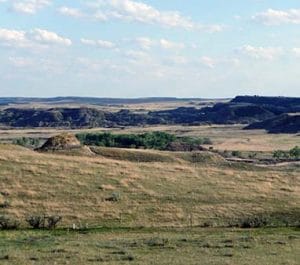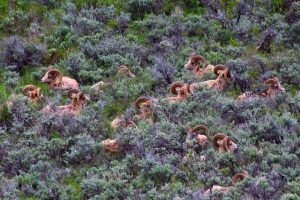
The 66th Montana Legislature adjourned this week and Montana’s hunters, anglers and wildlife enthusiasts have a lot of positive achievements that set up the next two years to be productive for wildlife and habitat.
This week saw Fish and Wildlife Commission appointments go through, as well as several major bills that benefit our habitat and fisheries get done in the final days. Here’s the rundown:
Sage Grouse Conservation Passes
The Senate gave final approval to SB 299 (Sen. Mike Lang, R-Malta) after a conference committee worked out differences with the House version of the bill. SB 299 as it passed requires a goal of no net loss of sage grouse habitat, with the goal of an increase in habitat. It codifies many aspects of the statewide sage grouse conservation plan. This bill was amended many times, but in its final form is a win for the conservation of sage grouse habitat in sagebrush-steppe areas. MWF is thankful to Sen. Lang for his willingness to work on this bill along with numerous partners.
Wildlife Location Data Bill, Resolution
The issue of how we use and protect specific wildlife location data was prominent this session, with a total of four different bills that addressed the issue. In the end, a bill to protect the data that Montana Fish, Wildlife and Parks biologists gather, SB 349 (Sen. Jill Cohenour, D-East Helena) passed the House this week and is heading to the governor. The bill makes it illegal to use specific wildlife location data from FWP to hunt or harass wildlife.
In addition, SJ 30 (Sen. Jill Cohenour, D-East Helena) calls for an interim study of how FWP handles it’s fish and wildlife location data. The study resolution sets up a thorough look at the issue by the Environmental Quality Council to make recommendations for legislation. Other states have given their wildlife agencies the ability to deny specific GPS wildlife location data to people, and it’s an issue worth looking at. The resolution passed the House on the final day of the session.
Aquatic Invasive Species Bill Passes
HB 411 (Rep. Willis Curdy, D-Missoula) funds the statewide Aquatic Invasive Species prevention program. In the last Legislative session, the program got up and running quickly and has been effective at doing boat inspections. The big question this session was how it would continue to be funded. HB 411 continues the fee on hydro-power generators, as well as fees on boats and on anglers. This bill is a win for all Montanans who share a common interest in keeping invasive mussels out of our waterways.
Commission Appointees
This week the Senate confirmed all four of the nominees for the Fish and Wildlife Commission. But it didn’t happen without some controversy.
The first resolution for confirmation, SR 28, was for Shane Colton of Billings and Tim Aldrich of Missoula. It passed out of the Senate Fish and Game committee unanimously and passed the Senate 47 to 3.
But the committee voted 7-3 on SR 48, to confirm Logan Brower of Scobey and Pat Byorth of Bozeman. Committee Chair Jennifer Fielder, R-Thompson Falls, expressed concerns of Brower’s support of mandatory trapper education, and Sen. Jason Ellsworth had issues with Byorth’s position with Montana Trout Unlimited, where he works as an attorney on water rights issues.
The Senate voted not to bring SR 48 forward, with Sen. Fred Thomas of Stevensville stating that the four-year term meant they will serve for the next governor, who should get to pick all five commissioners. But on the last day of the session in reconsidered. An amendment to strip Brower out failed and both were confirmed in a 31 to 19 vote. Both will serve until 2023.
Those are just the highlights from the last week in the session. MWF will be putting together a complete list of all the bills affecting wildlife, habitat, and access, as well as FWP’s budget, in the coming weeks. Look for it and other updates as a bunch of bills still await Gov. Bullock’s signature. You can still check the status of bills on our bill tracker on our homepage and continue to look for updates as we await the final resolution on all the bills.





